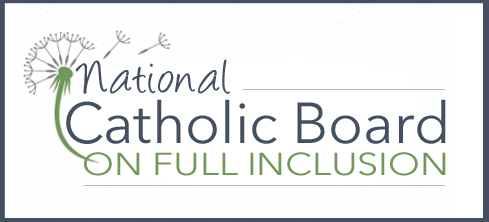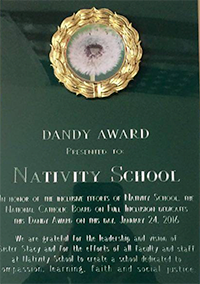If you have a disability and want to live an inclusive life, you need a community that welcomes you.
You need schools that fully include you.
You need employment that is both competitive and integrated.
You need living options that are inclusive.
You need what Dr. Erik Carter so powerfully describes as something more than inclusion: BELONGING.
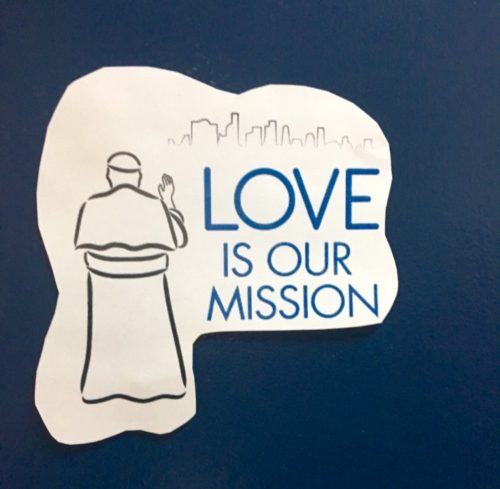
Love is our mission.
Nashville, Tennessee was chosen as the place for our First Ever Inclusive Catholic High School Conference for a very intentional reason:
Nashville is a city that provides a continuum of inclusion…a real chance at belonging.
What is a “continuum of inclusion”?
The National Catholic Board on Full Inclusion advocates for students with disabilities to attend their local Catholic schools from preschool through high school…but in the process of advocating for this, we’ve stumbled onto much bigger advocacy work…cities that offer a continuum of inclusion…preschool through college.
Right now there are only four cities in the nation that offer preschool through college inclusion:
Nashville, Tennessee
Charleston, South Carolina
Providence, Rhode Island
Fairfax, Virginia
FOUR.
We have many cities that offer chunks of inclusion…preschool through elementary with a side of a college program thrown in for good measure…or terrific inclusion preschool through high school with no college option, that is my home city of Davis, California…but there are only four that offer the complete continuum…and when you have that, well, you have a real chance at an inclusive adulthood.
It’s everything.
So, 50 Catholic educators from 10 states came to Nashville to learn and collaborate and encourage and problem solve.
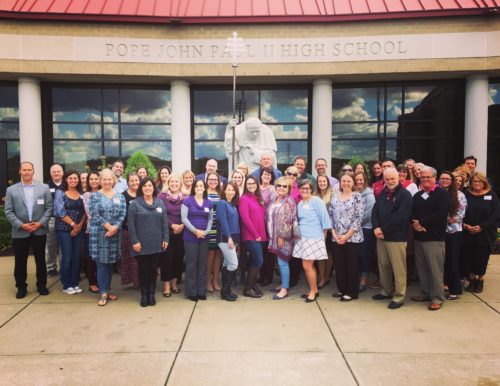
Catholic High School Inclusion Peeps Represent!
Co-Director of the Vanderbilt Kennedy Center for Excellence in Developmental Disabilities, Dr. Elise Macmillan, graciously guided our first day of learning at Vanderbilt University. She shared with us the incredible 50 year old history of the Kennedy Center and Eunice Kennedy-Shriver’s vision for inclusion for people with intellectual disabilities like her sister, Rosemary.
We were learning in hallowed halls and we could feel the grace surrounding us.
After a beautiful invocation from Father Mike:
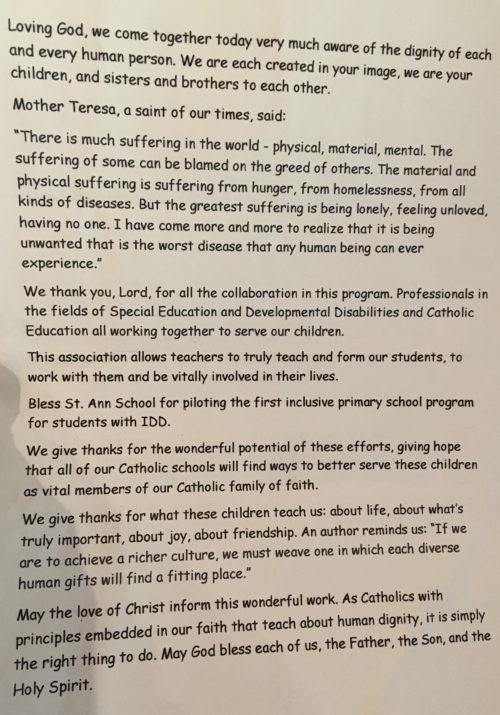
and after introductions by all of the amazing attendees – many of them experts in inclusive high school education themselves – Dr. Erik Carter, The Cornelius Vanderbilt Chair, shared his six reasons for why we must be inclusive as Catholic educators.
Erik shared powerful research, inspiring anecdotes and gave all of us the nudge forward that Catholic schools should be leading the way.
He ended with this point:
Inclusion can lead to the path of belonging…we want to support kids in such a way that relationships can develop…
Catholic schools can create that level of belonging.
What does that belonging look like?
According to Erik it is this crucial point: We are going to pursue you because you are missed.
Imagine if your parish school noticed if a student with a disability was not there…
AND PURSUED THAT CHILD?
Imagine the message for all children…YOU MATTER.
We all are poorer for your absence.
This level of belonging reminds us of the biblical story of the lost sheep…and how God aches for every lost person.
Our schools should share this same ache…we should work toward belonging, relationships, friendships every day.
After Dr. Erik Carter’s presentation, we listened to Dr. Ann Kaiser’s presentation in collaboration with Dr. Adelaide Nicholson, principal of St. Ann’s Catholic School in Nashville.
St. Ann’s is the beginning point of the continuum. Kindergarten through 8th grade…inclusive…welcoming…offering the powerful feeling of belonging.
Ann shared this important reminder:
“Love the kid in front of you and do the best evidence-based practice you can do in the moment.”
Sometimes as educators, we get fearful that we don’t have the expertise needed. We wonder if we really can include a student successfully.
With Ann’s words of wisdom, everyone can begin…just love the student in front of you.
Let them feel that love and acceptance.
Use evidence-based methods.
You can do this.
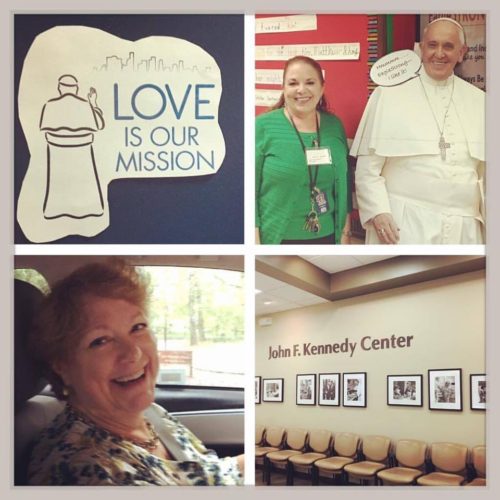
Dr. Adelaide Nicholson, Principal of St. Ann’s with the pop-up Pope…learning in hallowed halls…the amazing Margaret Burd, doting aunt and inclusion advocate extraordinaire.
After lunch we learned about Vanderbilt’s Inclusive Post-Secondary program called Next Steps. Tammy Day shared the details of the collaboration it took at the state level to get this program off the ground. After that, we went on a short tour of Vanderbilt’s campus with some Next Steps students as tour guides. They shared their educational journeys, their hopes and dreams for their future.
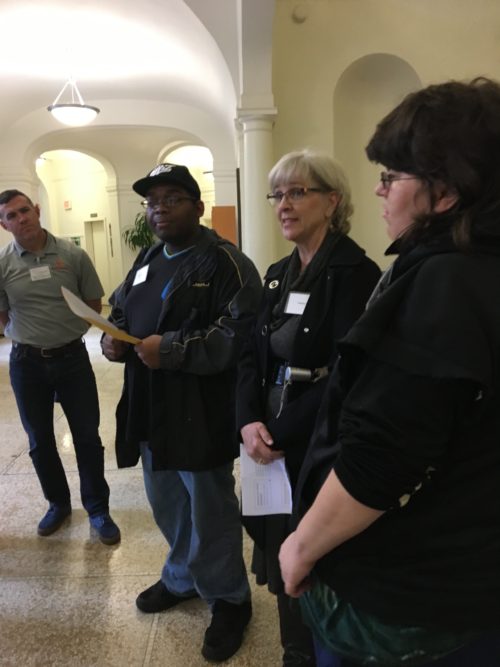
Next Steps Students Give Tours of Vanderbilt
Seeing Vanderbilt’s Next Steps program was a powerful reminder of just where our graduates from our inclusive Catholic high schools could be headed.
There are over 165 options for students with intellectual disabilities to attend college around the country…not a single one is Catholic.
At then end of the day, we had a chance for a visit to St. Ann’s, to see their inclusive program up close and in person. We met Maggie, the inclusive teacher responsible for St. Ann’s, and we heard anecdotes from parents within the program.
Our first day showed us the beginning and the end of school inclusion in Nashville…elementary school and college.
We were ready to see high school inclusion!
Tuesday, Mike Deely, the Headmaster for John Paul II High School in Hendersonville, Tennessee opened his doors to us.
He and Pam Eatman shared their Hand in Hand program.
They explained what inclusion looks like and then we headed into classrooms to see it for ourselves.
It’s hard to explain the influence of seeing students with disabilities sitting side by side typical students…like a pair of comfortable shoes, it just feels right.
Your soul rests.
Your heart knows.
This is what it means to cherish diversity…to honor the sacred and holy in each one of us.
This is what belonging looks like.
Megan Burton and Ashley Bascom from Cathedral Catholic High School in San Diego, California, shared their Options program and the overall way they make inclusion work at their school.
After that, we broke into three groups and rotated through three big ideas in inclusion for students in high school:
Fundraising
Academic Inclusion/Differentiation
Social Inclusion
We learned about peer mentors, academic possibilities, social inclusion and the profound transformation that students with disabilities bring to the school.
High achieving students find a way to make peer mentoring a priority.
Leaders of the school become passionate about social justice.
Students who have had academic struggles of their own suddenly find meaning in the struggle and make themselves available to support others.
This is our hope for our students.
Our hope for humanity.
Each of these pieces provides a glimpse into the intangible but powerful sense of belonging.
THANK YOU to Mary Desmarais, Megan Battle, Megan Burton, Pam Eatman, John Garrow for your leadership.
We were sorry to miss out on the expertise of Nancy McCoy…but she had a ten hour ride back home.
Eduheroes…all of them!
To the Dioceses of
Birmingham, Alabama
Orange, California
Sacramento, California
San Diego, California
Santa Rosa, California
Orlando, Florida
Springfield, Illinois
Kansas City/St, Joseph, Missouri
Portland, Oregon
Nashville, Tennessee
Arlington, Virginia
and the Archdioceses of
Chicago, Illinois
Philadelphia, Pennsylvania
THANK YOU for saying yes.
THANK YOU for working toward inclusion in Catholic schools.
THANK YOU for your willingness, your hard work and your commitment to this important effort.
We are so grateful.
These cities are budding continuums of inclusion…together, we can make inclusion the norm all over the country.
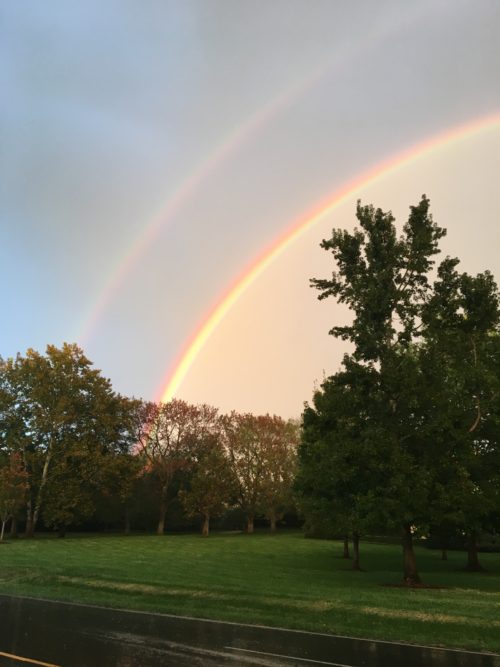
Rainbow in Nashville
After our second day ended, this was what was out my window.
A sign from the universe.
Thank you Nashville.
Thank you Mike Deely, Pam Eatman, Margaret Burd, Adelaide Nicholson and the entire faculty at Vanderbilt’s Peabody College for a truly incredible two days.
Looking forward to our second inclusion conference…stay tuned for the details.
